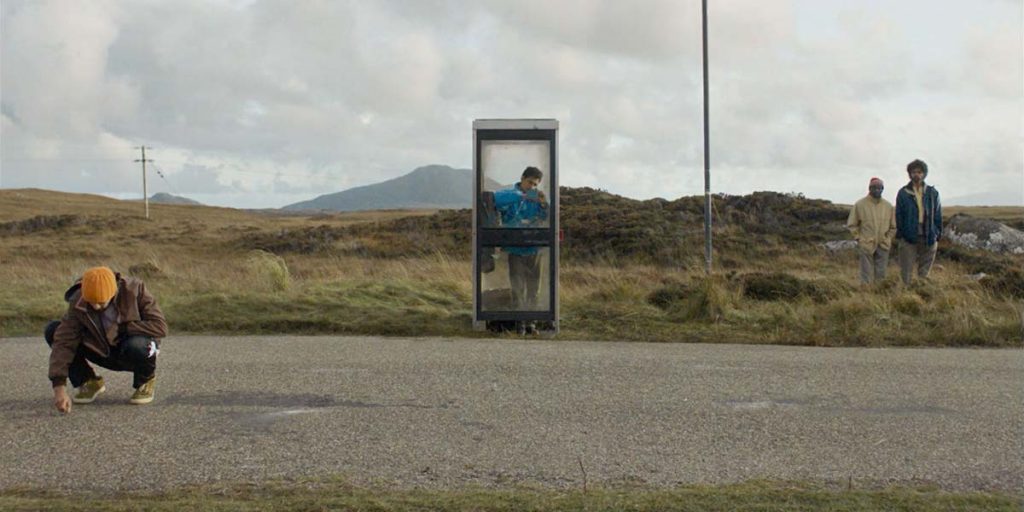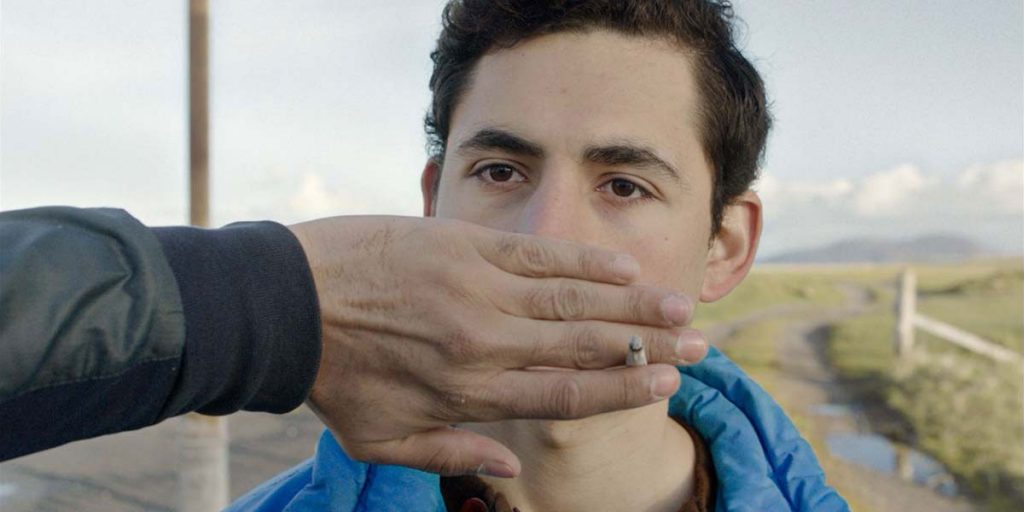Ben Sharrock’s Limbo (2020) documents the refugee experience with irony, wit and heart, telling the tale of a young Syrian musician waiting for asylum on a remote Scottish island.
When, at the beginning of Ben Sharrock’s Limbo (2020), one of the many refugees attending a cultural awareness class volunteers an example of how to use the verb “I used to” correctly, the sentence he picks is meaningful in more than one way. “I used to be happy before I came here”, he says. “I used to cry myself to sleep every night, but now I don’t have any tears left”. Helga (Sidse Babett-Knudsen) and Boris (Kenneth Collard), the obnoxious, eccentric locals hosting the class, applaud Abdul (Raadi Mahdi) for his high level of fluency in the English language, without even taking into consideration the meaning behind his words.
After all, their class has nothing to do with all that. At “Cultural Awareness 101“, the teachers are more interested in patronising dances and visual demonstration. Their staged, theatrical lessons are meant to teach their refugee students anything from the basics of consent (“sex: a smile is not an invitation”) to outdated, patronising clichés about the future, like how “you can be whatever you want as long as you work hard enough” – an American Dream ideal that feels more like an insult than an encouragement, considering that, for Abdul and his classmates, it couldn’t be further away from reality.
Also attending “Cultural Awareness 101” is the protagonist of Ben Sharrock’s Limbo, Omar (Amir El-Masry), one of the many refugees who are stuck on a remote Scottish island, awaiting the fate of their asylum requests. Just like everyone else, Omar, a young Syrian musician, was separated from his family: his parents are in Istanbul, and his brother might or might not still be in Syria, as he decided to “stay and fight” when Omar left. During one of his many calls to his parents, having reassured his mother that he’s been changing his bed sheets frequently enough, he explains that it’s been 32 months and 5 days since he last heard from his brother.

His mum asks him for money, but he doesn’t have any: he cannot work without asylum, and he’s still waiting for his request to be approved. When his father asks if the Scottish island where he’s been forced to wait is “like Guantanamo”, he responds that it isn’t, and we laugh, though, in a way, we also know that it is still a prison of sorts. There’s no happiness for Omar in the Uists – two islands in the Outer Hebrides of Scotland, as his life is indefinitely put on hold. “When will you go home?” his mother asks, knowing that his final destination, for the time being, was supposed to be London. “Soon”, he answers, though, how soon that will be, only time will tell.
Limbo isn’t the kind of film you’d expect. Judging by its subject matter, it’s easy to imagine a heartbreaking drama that tries its hardest to move you to tears. But director Ben Sharrock isn’t interested in neither self-pity nor easy rhetorics, and opts, instead, for an ironic, clever gem that perfectly balances introspection, heart and humour. For every hardship our protagonist has to endure, such as his inability to play his beloved oud, due to the plaster cast on his arm, there’s a moment of comic relief, such as Omar and his flatmates binge-watching Friends and arguing over whether or not Ross and Rachel really were on a break. It’s that kind of humour that leaves you with an aftertaste, as Limbo is also full of humanity.
And so we become acquainted with Omar’s flatmates Farhad (Vikash Bhai), Wasef (Ola Orebiyi) and Abedi (Kwabena Ansah), who come from Afghanistan, Sudan and Iraq, and each of them has something wise and meaningful to teach us. Farhad explains to us that you can tell a person’s expression even if they cover their faces, by looking into their eyes for signs of sadness or happiness. “You know, they put ourselves in the middle of nowhere to try and break us”, Abedi tells the others, convinced that their countries of origin used to be well-regarded but are not in fashion any more, as far as asylum requests go. “Maybe you are coming a year too late”, he tells Omar, who has his own wisdom to share. From him, we learn the Syrian saying “tomorrow there’ll be apricots“, which is generally used to describe a wish for something that will never happen. This harshest, more realistic kind of ideal sums up his state of mind in the film, as he looks into himself and searches for an answer that might never come.
Limbo puts us face to face with the kind of experience that divides you into two distinct human beings – the person you used to be and the aimless, fragile shell you’ve become. Stuck in a maddening limbo, estranged from his family and with his own country at war, Omar is consumed by guilt, regret and self-doubt. What if he had stayed? What if he had left? What if he leaves right now? What if he stays? There’s no right or wrong decision: instead, there are endless possibilities, and a lifetime of waiting. Limbo perfectly captures the feeling of becoming a stranger in your own life, suddenly finding yourself alone in an unfamiliar place, and it does so with clever writing, impressive acting, stunning cinematography and a deeply immersive narrative. It’s filmmaking at its best, and it’s guaranteed to stay with you long after the credits roll.
Limbo premiered at the BFI London Film Festival on Friday, 16 October 2020, and is now available to watch on digital and on demand.

